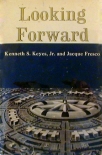Looking Forward by Kenneth Jr. (reading diary .txt) 📕

Read free book «Looking Forward by Kenneth Jr. (reading diary .txt) 📕» - read online or download for free at americanlibrarybooks.com
- Author: Kenneth Jr.
Read book online «Looking Forward by Kenneth Jr. (reading diary .txt) 📕». Author - Kenneth Jr.
None of the above methods of settling the dispute may be called scientific. The words go ’round and ’round, the tempers go up and up, but all this has very little to do with who can run faster. Finally, some little genius perched on a branch interrupts the sweating people below, “Why don’t we let them run to the big oak tree over there and see who is faster?” This genius has proposed a method of settling the dispute that would probably enable most reasonable men to reach agreement. It is the method of science. It is a method that does not involve the use of words to decide the problem.
The two men get ready to run. The signal is given. They start running. Everybody stops arguing and starts observing. They are anxious to know the facts. They use their senses to report information that will help them decide. They will carefully note whether Onk arrives first, Donk arrives first, or whether they both get there at the same time. The argument as to which could run faster is settled at that time by using the scientific method.
If these cave men had generalized the lesson and had decided to use observation to test all their arguments, problems, ideas, and theories, the human race could have developed today’s civilization about fifty thousand years ago! They could have fought out all of the atomic wars and gone through the uncomfortable transition periods a long time before we came on the scene to sweat it out. But instead we find that man became too intrigued with verbal intricacies and developed the habit of using verbal means to decide between “true” and “false.”
The Greek philosopher Aristotle had one of the most brilliant minds the world has ever produced. According to some ancient authors, he wrote 1,000 volumes that covered practically every field of learning. When Aristotle was writing on physics, he explained that a heavy object would fall faster than a light object of the same shape and material. This verbal conclusion seemed so natural and obvious to him! How silly to bother with testing. He just reasoned it out in a way that seemed logical. Weight makes things fall. Therefore, the more weight, the faster the fall. Seems reasonable, doesn’t it? Aristotle had many assistants, and it would have been very easy for him to check this by actually dropping a light rock and a heavy rock from the top of the Parthenon. But he did not depend on the scientific method for checking his thinking. He liked to prove things rationally, logically, intellectually. He didn’t know it was necessary to test the results of his brilliant mind by observation.
You and I lost two thousand years of progress because of this non-scientific attitude of Aristotle’s age. In the sixteenth century Galileo began to wonder about the predictability of Aristotle’s theory of falling objects. But he didn’t refute Aristotle with intellectual argument. He used the scientific method for checking it out. He let the facts speak for themselves. Instead of “settling” the problem by words, he dropped a heavy weight and a light weight at the same time. They both hit the ground simultaneously. “Nature” had spoken. Sane people stopped arguing about the problem. Regardless of how illogical it might seem to us, the facts are that the weight of an object, under standard conditions, does not determine the rate at which it falls.
When we test our ideas by our senses, we can go forward. We can build useful structures of reliable knowledge. We can predict. The unscientific tendency to believe without testing is not, alas, confined to the Ancient Greeks. “Men are apt to be much more influenced by words,” said the famous scientist Pavlov, “then by the actual facts of the surrounding reality.”
Scientific Methodology
Scientific thinking may be boiled down to three steps:
Coming Up with New Ideas. We use our imagination, intuition, memory, etc. to suggest ways of explaining or solving a problem.
Processing Ideas Mentally. We analyze our thoughts to determine a way to test them by observation. By logic we can determine how well our brain child fits in with known facts. We can try to figure out intellectually how well it will work. What will be its consequences?
Testing by Observation. After we have found a possible new solution to our problem, explored it, and figured out a way to check it, we are then ready to take the third step which will make our thinking scientific. This is testing by observation. This is where we shut up and let observable facts do the talking.
The Scientific Method in Action
Suppose you were to get into an argument with someone about whether a chameleon will change its color to match its surroundings. Perhaps you have heard the tale of a chameleon that went crazy trying to match a Scotch plaid. Now, if you would want to pursue this matter in an argumentative or philosophical fashion, you could just stand around whirling the words all day and night. But if you felt like getting useful information on the





Comments (0)